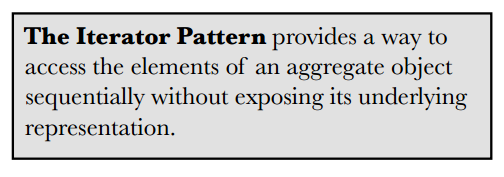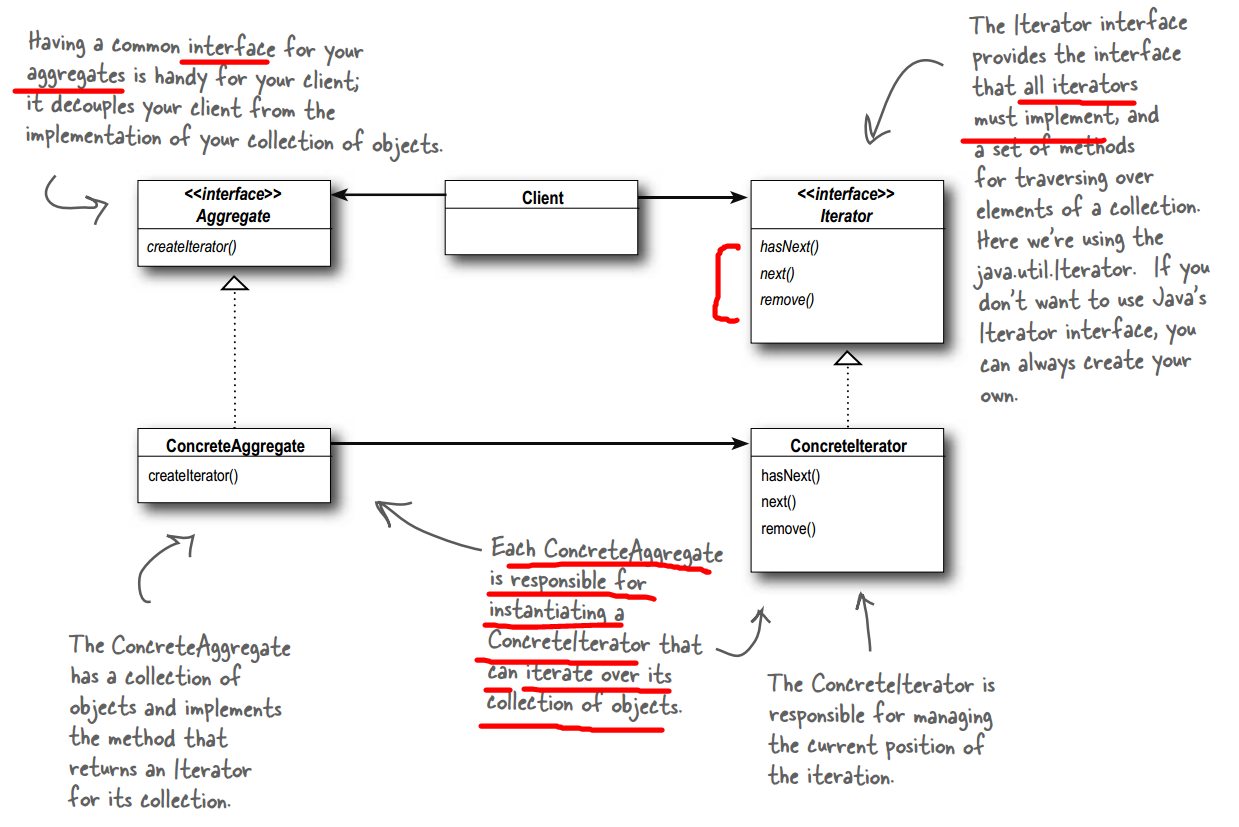迭代器模式(Iterator Pattern)
2016-11-28 14:24
351 查看
1. 迭代器模式定义
提供一种方法顺序访问一个聚合对象中各个元素,而又不需暴露该对象的内部表示。
适用性:
访问一个聚合对象的内容而无需暴露它的内部表示。
支持对聚合对象的多种遍历。
为遍历不同的聚合结构提供一个统一的接口(即, 支持多态迭代)。
类图:

2. 实例
//测试
public class IteratorPatternTest {
public static void main(String[] args){
Collection collection=new MyCollection();
Iterator iterator=collection.createIterator();
while(iterator.hasNext()){
String s=iterator.next().toString();
System.out.println(s);
}
}
}
//集合接口
interface Collection{
public Iterator createIterator();
public Object get(int pos);
public int size();
}
//集合接口的实现类
class MyCollection implements Collection{
private String str[]={"a","b","c","d","e","f"};
@Override
public Iterator createIterator(){
return new MyIterator(this);
}
@Override
public Object get(int pos){
return str[pos];
}
@Override
public int size(){
return str.length;
}
}
//迭代器接口
interface Iterator{
public boolean hasNext();
public Object next();
//public void remove();
}
//迭代器接口的实现类
class MyIterator implements Iterator{
private Collection collection=null;
private int pos=-1;
public MyIterator(Collection collection){
this.collection=collection;
}
@Override
public boolean hasNext(){
if(pos<collection.size()-1){
return true;
}
return false;
}
@Override
public Object next(){
if(hasNext()){
pos++;
}
return collection.get(pos);
}
}运行结果:
a b c d e f
相关文章推荐
- 我所理解的设计模式(C++实现)——迭代器模式(Iterator Pattern)
- 迭代器模式(Iterator Pattern)
- 设计模式14 - 迭代器模式【Iterator Pattern】
- NET设计模式(18):迭代器模式(Iterator Pattern)(转载)
- (第Ⅳ部分 行为型模式篇) 第17章 迭代器模式(Iterator Pattern)
- 迭代器模式(Iterator pattern)
- 迭代器模式(Iterator pattern)
- .NET设计模式(18):迭代器模式(Iterator Pattern)
- 模式十:迭代器模式(Iterator Pattern)——顺序访问聚合对象元素
- 第 14 章 迭代器模式【Iterator Pattern】
- 设计模式之迭代器模式(Iterator Pattern)
- .NET设计模式(18):迭代器模式(Iterator Pattern)(转)
- 【23种设计模式】之 迭代器模式(Iterator Pattern)
- C#设计模式——迭代器模式(Iterator Pattern)
- 迭代器模式(Iterator Pattern)
- 设计模式学习总结-迭代器模式(Iterator Pattern)
- 【设计模式】迭代器模式(Iterator Pattern)
- C#设计模式(16)——迭代器模式(Iterator Pattern)
- 迭代器模式(Iterator Pattern)
- (第Ⅳ部分 行为型模式篇) 第17章 迭代器模式(Iterator Pattern)
